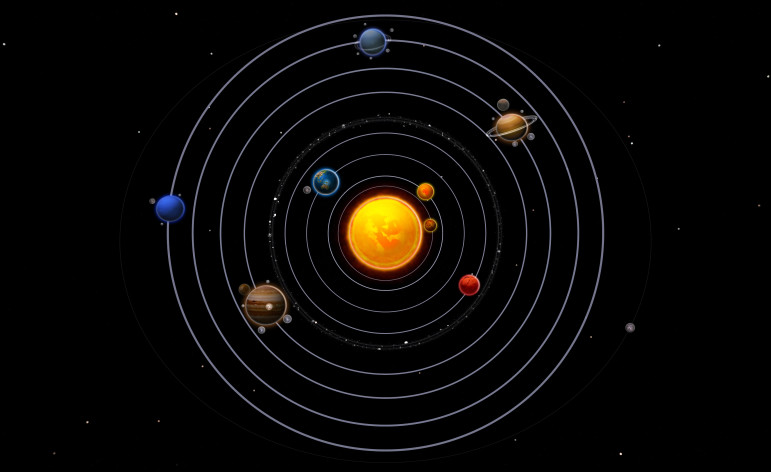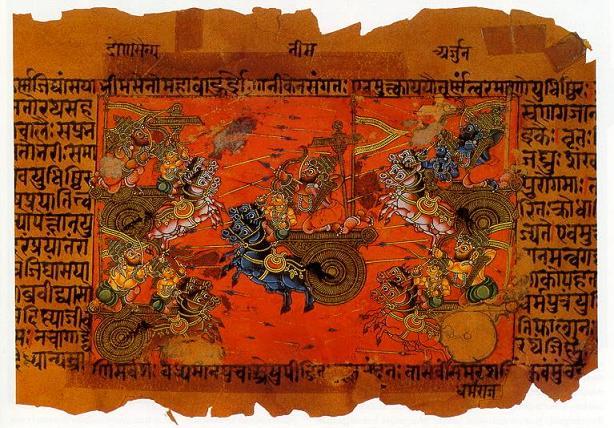Vedas and ancient Indian science theories are often considered as the most advanced works in the world from their era. There are scientists taking who are fascinated by the knowledge of the ancient Indian scholars and dedicated their life researching on the ancient Indian Science.
The list here presents 12 greatest ever inventions of ancient Indian science.
1. They Knew The Existence Of Solar System Long Before 

“The sun moves in its own orbit but holding earth and other heavenly bodies in a manner that they do not collide with each other through force of attraction.” – Rig Veda 1.35.9
2. They Theorized Gravity Way Before The Western World
The verse 10.22.14 of Rig Veda says:
“This earth is devoid of hands and legs, yet it moves ahead. All the objects over the earth also move with it. It moves around the sun”.
3. They Knew The Speed Of Light Way Before The Rest Of The World Knew It
A Vedic scholar by the name of Sayana discovered the speed of light back in the 14th century AD.
His quote which translates to:
“With deep respect, I bow to the sun, who travels 2,202 yojanas in half a nimesha.”
A yojana is approximately 9 miles; a nimesha is 16/75 of a second.
So, 2,202 yojanas x 9 miles x 75/8 nimeshas = 185,794 miles per second which is remarkably equal to the actual value of 186 282.397 miles per second.
4. They Knew The Science Behind Eclipses When The Rest Of The World Was Scared Thinking Eclipses Are Caused By Some Sort Of Black Magic
“O Sun! When you are blocked by the one whom you gifted your own light (moon), then earth will be surprised by the sudden darkness.”
This is a remarkably accurate description of a solar eclipse.
The Vedas’ detailed descriptions of the universe, planets, and other phenomena demonstrates the vast knowledge of the people of those times far before modern civilization even started to exist.
5. Nikola Tesla Took Inspiration From Swamy Vivenakanda And Indian Vedas For His World Acclaimed Work
After his lab was burned down and his life’s work had vanished. Nikola Tesla studied the concept of Prana and Akasha to work on FORCE and MATTER. He developed a new perspective on the world and started viewing world in terms of frequencies and energy which resulted in him establishing his concepts on energy.
We intended to write this article not to take sides or argue against anyone’s beliefs but only to give a small idea on the intensity of the knowledge and imagination of our ancestors.
They even had the concept of sustainable energy, projectile science, and many others like Thrust, momentum, Thermodynamics, Astrophysics etc to name a few.
6. They Measured The Circumference Of The Earth
Brahmagupta in the 7th century CE proposed that the circumference of the Earth to be 36,000 km, which is close to the actual figure of 40,075 km, with an error margin of 1%.
7. They Estimated The Length Of An Year
Surya Sidhhanta speaks of 4 ways to measure the length of an year namely ‘Nakshatra’, ‘Savana’, ‘Lunar’ and ‘Saura’. Of these The Saura method accurately estimates the length of year to be 365 days, 6 hours 12 mins and 30 seconds. If you are still wondering how they could do it go and visit temples at Konark or Hampi where you will find the incredibly complex and technically correct architecture systems of the temples that use the sunlight to measure the length of the day and year.
8. They Deduced Pi Value
Aryabhata worked on the approximation of value of pi (π) and came to the conclusion that
is irrational and is approximately 3.1416 in 499 CE when he was 23 years old.
He can be considered as one of the smartest brains of ancient India because because the irrationality of pi was proved in Europe only in 1761 by Lambert.
Not to mention, he even derived the values of sine & cos and gave birth to the concept of trigonometry.
9. They Theorized That Earth Is A Sphere
Although the discovery of Earth being round is credited to Greek astronomers. Interestingly, Indian astronomers had already claimed that Sun is a star and that earth is spherical long before the Greeks. It is documented that various attempts had been made to measure the circumference of earth during the Vedic periods. Aryabhata deduced a formulation which proves that the Earth is rotating on an axis. By estimating the value of pi to be 3.1416 he deduced the circumference of earth to be 39736 Kilometers which is only 100 kilometers below its true value.
In fact, in his book Aryabhatiya, he also asserts that the movement of heavenly bodies like the sun, the stars are all relative, and only earth is moving.
“Just as a passenger in a boat moving downstream sees the stationary (trees on the river banks) as traversing upstream, so does an observer on earth see the fixed stars as moving towards the west at exactly the same speed (at which the earth moves from west to east.” -translated from Aryabhatiya Gola 9
10. They Build The Worlds First Underground Drainage System
Indus valley civilization designed the worlds first Underground sanitation system back in 3300–1300 BCE which was adopted by the rest of the world centuries later. They are also the first civilization to create modern sanitation.
11. They Theorized And Actually Implemented The Concept Of Surgical Procedures Using Surgical Tools Centuries Before The Rest Of The World
The Sushruta Samhita written by Sage Sushruta is the earliest medical encyclopaedia known to world being written during 1200BC containing 184 chapters contains descriptions of 1,120 illnesses, 700 medicinal plants, 64 preparations from mineral sources and 57 preparations based on animal sources. You name a disease and it has a chapter on it.
It was announced in a scientific journal that the oldest and the first evidence for the drilling of human teeth of a living person was found in Mehrgarh. Eleven drilled molar crowns from nine adults were discovered in a graveyard in Mehrgarh that dates from 7,500–9,000 years ago. A few evidences of orthopedic surgeries were also found concluding that ancient India had the technology to implement surgical procedures. Anesthesia was made using herbs in Ayurveda.
12. They Theorized The Concept Of Cloning, Test Tube Babies And Surrogate Mothers
The epic Mahabharata describes Gandhari as a mother of 100 sons who were called Kauravas, the eldest of them being Dhuryodhana. The Kauravas were created by splitting the single embryo into 100 parts and growing each part in a separate kund (container).
The birth story of Karna & the Pandavas shockingly resembles the modern Test Tube Baby concept. Being born from the “characteristics adopted from men of her choice”
In other words, they not only had the concept of cloning, Test Tube Babies and embryo spliting but also had the dream to grow human fetuses outside the body of a woman something that is not known to modern science very recently.
Source: 12 Things That Prove Indian Mythological Literature is full of Scientific Innovations

